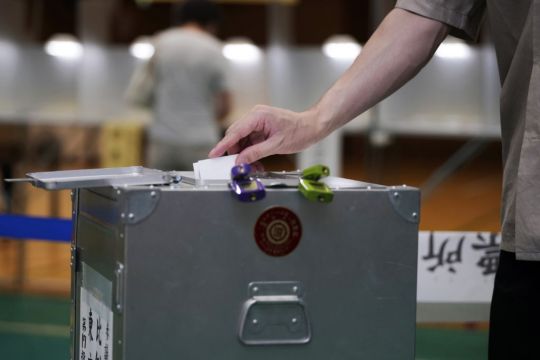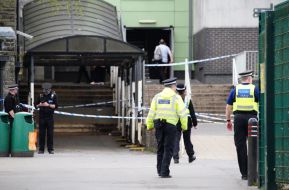Japanese voters went to the polls on Sunday in the shadow of the assassination of former prime minister Shinzo Abe.
The fatal attack on the former leader brought about heightened security, as party leaders avoided mingling with crowds and delivered messages of upholding democracy and free speech during campaigning the day before.
Exit polls for the election for the parliament’s upper house showed Mr Abe’s governing party certain to win a major victory, possibly propelled by what is seen as a wave of sympathy votes in a country still reeling from the shock of Friday’s shooting.

The alleged assassin was sent by police in western Japan to a local prosecutors’ office on Sunday for further investigation.
A top regional police official acknowledged possible security lapses that had allowed the attacker to get so close and fire a bullet at the still-influential former Japanese leader.
Exit polls by NHK public broadcaster and other media showed the governing Liberal Democratic Party (LDP) was certain to secure a single majority of 125 seats, or half of the upper house, the less powerful of the two chambers.
It is a major boost for Prime Minister Fumio Kishida, who stands to rule without interruption until a scheduled election in 2025.
In the wake of Mr Abe’s assassination, Sunday’s election had a new meaning, with all political leaders emphasising the importance of free speech and their pledge not to back down on violence against democracy.

Mourners visited the LDP headquarters to lay flowers and pray for Mr Abe as party officials prepared for vote-counting inside.
“We absolutely refuse to let violence shut out free speech,” Mr Kishida said in his final rally in the northern city of Niigata on Saturday.
“We must demonstrate that our democracy and election will not back down on violence.”
Mr Abe was shot in Nara on Friday and airlifted to hospital but died of blood loss.
Police arrested a former member of Japan’s navy at the scene and confiscated a homemade gun.
Several others were later found at his apartment.

The suspect, Tetsuya Yamagami, told investigators he had acted because of Mr Abe’s rumoured connection to an organisation that he resented, police said, but had no problem with the former leader’s political views.
The man had developed hatred towards a religious group that his mother was obsessed about and that bankrupted a family business, according to media reports, including some that identified the group as the Unification Church.
Mr Abe’s body, carried in a black hearse accompanied by his wife, Akie, returned to his home in Tokyo’s Shibuya district, where many mourners, including Mr Kishida and top party officials, paid tribute.
His wake and funeral are expected in coming days.
Nara prefectural police chief Tomoaki Onizuka said on Saturday that Mr Abe’s assassination was the “greatest regret” in his 27-year career.
He said problems with security were undeniable, that he took the shooting seriously and would review procedures.

Japan is known for its strict gun laws. With a population of 125 million, it had only 21 gun-related criminal cases in 2020, according to the latest government crime paper.
But experts say that some recent attacks involved the use of consumer items such as petrol, suggesting increased risks for ordinary people to become embroiled in mass attacks.
Mr Abe was highly influential in the LDP, even after stepping down as prime minister in 2020, and headed its largest faction.
His absence could change the power balance in the governing party that has almost uninterruptedly ruled post-war Japan since its 1955 foundation, experts said.







